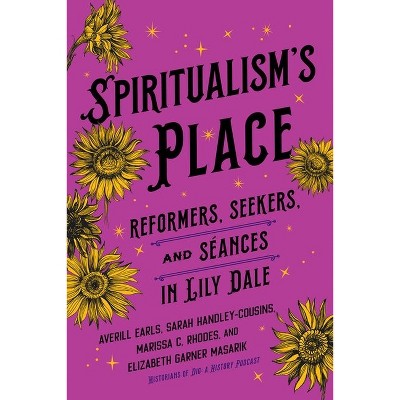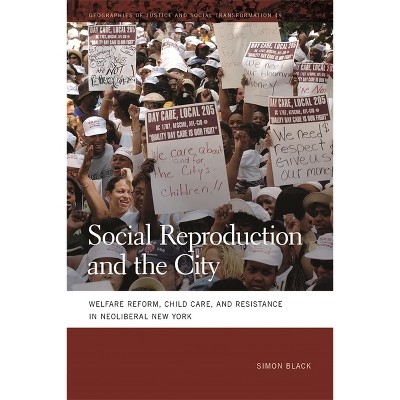$114.95 sale price when purchased online
$120.95 list price
Target Online store #3991
About this item
Highlights
- With The Sentimental State, Elizabeth Garner Masarik shows how middle-class women, both white and Black, harnessed the nineteenth-century "culture of sentiment" to generate political action in the Progressive Era.
- About the Author: Elizabeth Garner Masarik is assistant professor of History at SUNY Brockport.
- 236 Pages
- Political Science, Public Policy
Description
About the Book
"This book shows how middle-class women, both white and Black, harnessed the nineteenth-century "culture of sentiment" to generate political action in the Progressive Era. Sentimentalism marched right alongside women's step into the public sphere of political action. The concerns over infant mortality and the "fall" of young women interconnected with sentimentalism to elicit public action in the formation of the American welfare state. Elements of the associational state were built by the voluntary and paid work of female reformers working in the late nineteenth and early twentieth century. Women saw a need, filled it, and cobbled together a network of voluntary organizations that tapped state funding and support when available. Their work provided safeguards for women and children and created a network of female-oriented programs that policed and aided women of child-bearing age at the turn of the twentieth century. This book demonstrates the strength of the connection between the nineteenth century sentimental culture and female political action, defined as government support for infant and maternal welfare, in the twentieth century"--Book Synopsis
With The Sentimental State, Elizabeth Garner Masarik shows how middle-class women, both white and Black, harnessed the nineteenth-century "culture of sentiment" to generate political action in the Progressive Era. While eighteenth-century rationalism had relied upon the development of the analytic mind as the basis for acquiring truth, nineteenth-century sentimentalism hinged upon human emotional responses and the public's capacity to feel sympathy to establish morally based truth and build support for improving the welfare of women and children.
Sentimentalism marched right alongside women's steps into the public sphere of political action. The concerns over infant mortality and the "fall" of young women intertwined with sentimentalism to elicit public action in the formation of the American welfare state. The work of voluntary and paid female reformers during the late-nineteenth and early-twentieth centuries shaped what would become lasting collaborations between grassroots voluntary organizations and the national government. Women saw a social need, filled it, and cobbled together a network of voluntary organizations that tapped state funding and support when available. Their work provided safeguards for women and children and created a network of female-oriented programs that both aided and policed women of child-bearing age at the turn of the twentieth century. Through an examination of these reform programs, Masarik demonstrates the strong connection between nineteenth-century sentimental culture and female political action, advocating government support for infant and maternal welfare, in the twentieth century.Review Quotes
By tracing the formation of private-run organizations and their connection to nascent legislation protecting the sanctity of children and motherhood, Masarik provides an alternative history of the formation of the modern welfare state. The voluntary, unpaid, and often unrecognized labor performed by middle-class white and Black women not only facilitated the creation of these national welfare programs but also continues to define modern debates over their impact.--Kathryn Angelica "American Historical Review"
What a powerful claim about the ongoing impact of a nineteenth-century literary genre--that it simultaneously paved the way for the welfare state of the twentieth century, and perpetuated women's . . . second-class status. Scholars and students of women's history, women's work, and social welfare history will all benefit from Masarik's thoughtful work.--Abby Trollinger "Journal of the Gilded Age and Progressive Era"
Squarely placing gender at the center of its argument, The Sentimental State makes an important and necessary contribution to the existing scholarly literature on the growth of the modern welfare state. By adeptly demonstrating that nineteenth-century sentimental culture proved essential to the roots of early twentieth-century women's political activism, Elizabeth Garner Masarik reframes the chronology of the emergence of the modern welfare state.--Felicity M. Turner "author of Proving Pregnancy: Gender, Law, and Medical Knowledge in Nineteenth Century America"
About the Author
Elizabeth Garner Masarik is assistant professor of History at SUNY Brockport.Dimensions (Overall): 9.0 Inches (H) x 6.0 Inches (W) x .69 Inches (D)
Weight: 1.15 Pounds
Suggested Age: 22 Years and Up
Number of Pages: 236
Genre: Political Science
Sub-Genre: Public Policy
Publisher: University of Georgia Press
Theme: Social Services & Welfare
Format: Hardcover
Author: Elizabeth Garner Masarik
Language: English
Street Date: April 1, 2024
TCIN: 90966573
UPC: 9780820366067
Item Number (DPCI): 247-18-2588
Origin: Made in the USA or Imported
Shipping details
Estimated ship dimensions: 0.69 inches length x 6 inches width x 9 inches height
Estimated ship weight: 1.15 pounds
We regret that this item cannot be shipped to PO Boxes.
This item cannot be shipped to the following locations: American Samoa (see also separate entry under AS), Guam (see also separate entry under GU), Northern Mariana Islands, Puerto Rico (see also separate entry under PR), United States Minor Outlying Islands, Virgin Islands, U.S., APO/FPO
Return details
This item can be returned to any Target store or Target.com.
This item must be returned within 90 days of the date it was purchased in store, shipped, delivered by a Shipt shopper, or made ready for pickup.
See the return policy for complete information.












